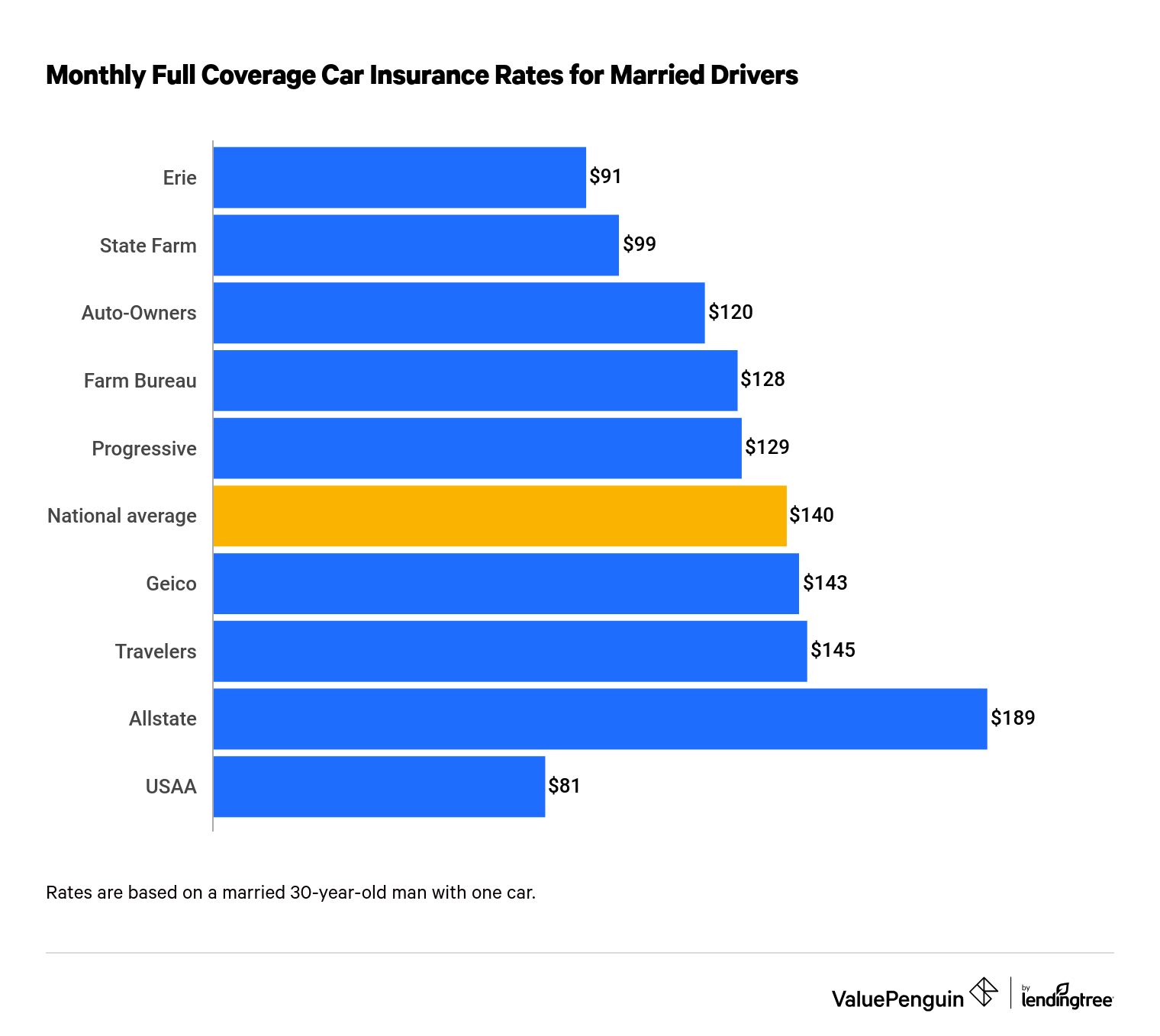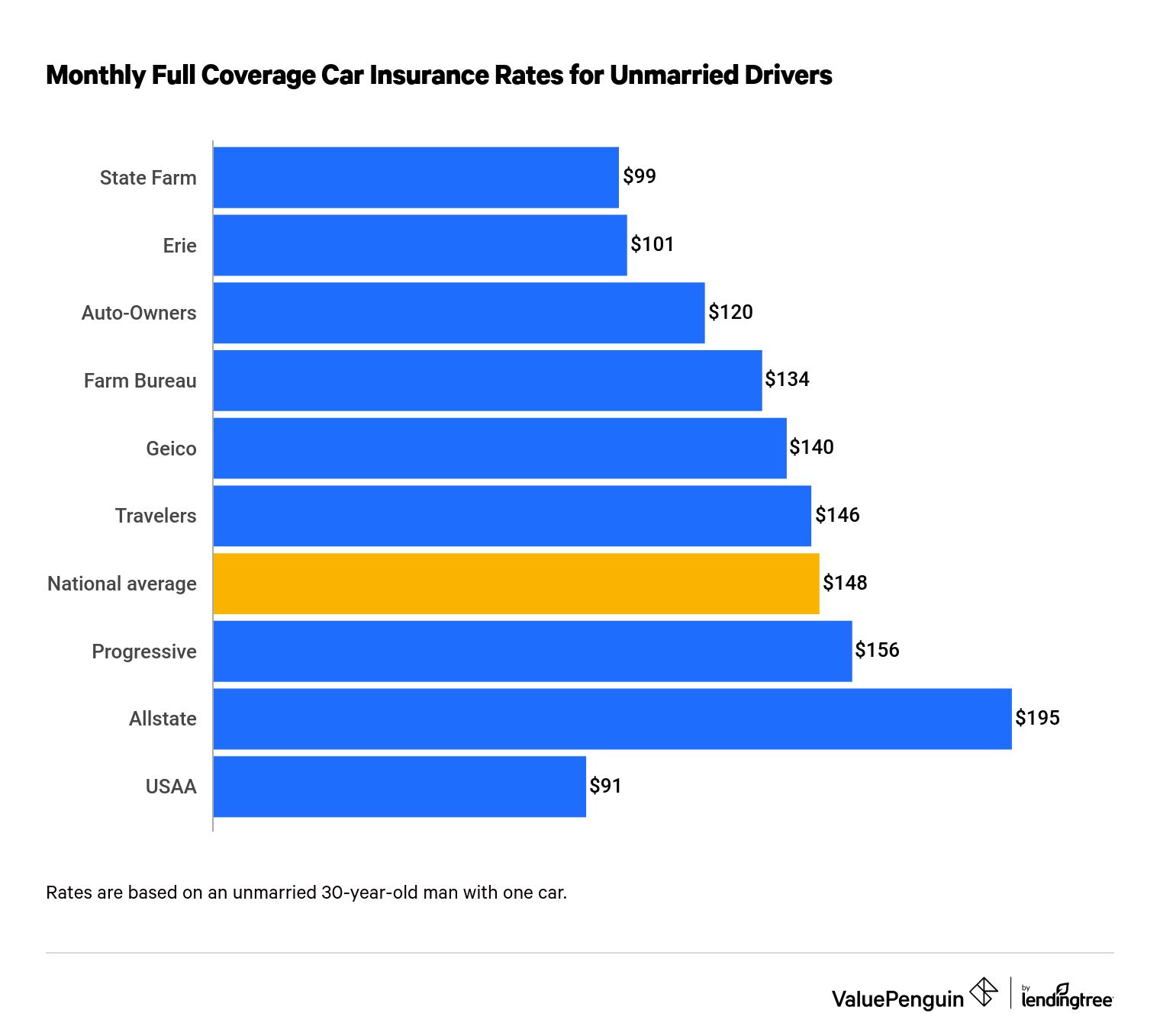Best Cheap Car Insurance for Married & Unmarried Couples
Erie has the best cheap car insurance for married couples at $91 per month for full coverage car insurance. State Farm is the cheapest option for unmarried couples at $99 per month.
Bundle & Save
Auto
Home
Married drivers pay $140 per month for full coverage car insurance — on average 5% less than unmarried drivers.
Rates go down when you get married because insurance companies consider married couples more financially stable and risk-averse. That means they're less likely to get in an accident or file a claim.
Cheapest car insurance for married couples: Erie
Erie has the best cheap car insurance for married drivers, with an average rate of $91 per month for a full coverage policy.
That's 10% cheaper than Erie charges unmarried drivers and $49 less per month than the national average. However, Erie is only available in 12 states and Washington, D.C.
Drivers who can't get coverage from Erie should consider State Farm. Although State Farm charges married drivers the same amount for car insurance as unmarried drivers, it is still the cheapest option for most people at $99 per month for full coverage.

Bundle & Save
Auto
Home
USAA offers even cheaper rates to current and former military members and their families. Full coverage from USAA is just $81 per month for married drivers, which is $10 cheaper than Erie's rates.
Progressive offers the biggest discount for married couples at 21%, but it's still costs more than Erie and State Farm.
Full coverage car insurance rates for married drivers with one car
On average, married couples can expect to pay around $140 per month for a full coverage policy covering one car. Couples with more than one vehicle can get a multi-car discount and get even cheaper car insurance rates.
Newlywed couples should shop around for car insurance to get the best rates. If one spouse's driving record, credit score or car price is much different from the other's, we suggest getting quotes for both separate and joint policies to ensure your costs are as low as possible.
Cheapest insurance for unmarried couples: State Farm
State Farm has the cheapest car insurance quotes for unmarried drivers among the largest insurers at $99 per month for a full coverage policy.
State Farm doesn't give a discount to married drivers, so you'll pay the same rate, regardless of relationship status.

Bundle & Save
Auto
Home
The average cost of full coverage car insurance for unmarried drivers is $148 per month nationally.
If you and your partner have similar driving and credit histories and are close in age, adding them to your policy may not increase your rates. However, your rates could increase if they have bad credit or tickets or accidents on their record.
Married vs. single car insurance rates by state
Missouri has the biggest rate difference between married and single drivers. Married drivers pay $15 less per month for full coverage than unmarried drivers.
On the other hand, married drivers in North Carolina pay $4 more per month than their unmarried counterparts.
Monthly full coverage car insurance rates by state
State | Single | Married | Difference |
|---|---|---|---|
| Alabama | $139 | $128 | $11 |
| Alaska | $117 | $109 | $9 |
| Arizona | $160 | $147 | $13 |
| Arkansas | $138 | $124 | $14 |
| California | $146 | $132 | $14 |
Discounts on car insurance for married couples
There is no specific car insurance discount for being married. Insurance companies automatically factor your marital status into your rates.
However, there are many standard car insurance discounts married couples can take advantage of to lower their rates.
Married couples can also earn discounts for:
- Paying your policy balance in full
- Making automatic payments
- Avoiding accidents and tickets
- Driving fewer miles
- Installing an anti-theft device
- Driving a brand-new car
- Taking a defensive driver course
Car insurance discounts for young married couples
Although young married couples will generally pay less than their single peers, insurance companies charge all younger drivers higher rates. Their lack of experience behind the wheel makes them more likely to make a mistake and cause an accident.
By maximizing your discounts, young married couples can save even more on their car insurance quotes.
- If you're married college students, you may be eligible for good student discounts, which can save between 5% to 25%.
- If both you and your spouse are safe drivers, consider a telematics program that monitors your driving habits and rewards safe driving.
Can married couples have separate car insurance?
Married couples can have separate car insurance policies, but most drivers benefit from sharing a policy with their spouse.
For example, if you share car insurance with your spouse and have multiple cars, you can save money with a multi-car discount.
In rare situations, however, spouses might want to consider separate car insurance policies rather than a joint policy.
Let's say you drive an SUV and have a clean driving record and high credit score. Your spouse, by contrast, drives a sports car, has accidents on their record and a poor credit score.
When you combine your car insurance into a joint policy, you will probably pay more than you did as a single driver. Your spouse will likely pay far less than they did as a single driver because they'll benefit from your clean record, safe car and higher credit score.
If your car price, credit or driving history differs from your spouse's, you should compare quotes from multiple companies for both joint and individual policies.
Chances are you'll still end up paying less as a couple by sharing a car insurance policy. However, if your costs are lower for separate policies — or for whatever reason, you don't want your spouse to drive your car — excluding them from your car insurance policy might be the better route.
Excluding your spouse from your car insurance
Many insurance companies require you to list all the licensed drivers in a household on your policy — and that includes your spouse. However, you can call your insurance company to request a named-driver exclusion.
A named-driver exclusion means your insurance will not cover your spouse if they drive your car, so your insurance company won't pay for any damages if your spouse gets in an accident.
Once you've excluded your spouse from your car insurance policy, you should not allow your spouse to drive your car.
Not all states allow named-driver exclusions. Check your state's regulations and talk to your insurance agent before excluding your spouse from your policy.
Can unmarried couples be on the same car insurance?
If you and your partner live together, many insurance companies will allow you to share a policy that includes both of you and your cars.
In fact, insurance companies usually require you to list everyone you live with on your policy. If you don't add your partner to your policy, your car insurance company may not pay for damages if they get into an accident in your car. If you don't want to list your partner on your policy, you can exclude them.
The benefit of sharing a policy with your boyfriend or girlfriend is that you can qualify for a multi-car discount if you have more than one vehicle. However, insurance companies may not lower your car insurance rates like they would for a married couple.
Unmarried drivers can only share a policy if living together.
How to add someone to your car insurance
If you've decided you want to share car insurance with your spouse or partner, you'll need to:
- Decide how much coverage you need
- Gather the necessary paperwork
- Compare quotes from multiple insurance companies
Before reaching out to insurance companies for quotes, you should have a candid conversation with your partner about their driving history, credit score, previous insurance coverage and the value of their car. If your answers are much different, compare quotes for individual and joint policies. While combining policies is generally the more affordable choice, it's good to check.
Frequently asked questions
Is car insurance cheaper if you're married or single?
Car insurance is usually cheaper for married drivers. On average, they pay 5% less for full coverage insurance than unmarried drivers, which saves about $8 per month.
Why is car insurance cheaper if you're married?
Insurance companies tend to charge married drivers less for insurance because statistically, they're more risk-averse and financially stable. That means they're involved in fewer car accidents and file fewer claims than unmarried drivers, making them cheaper to insure.
Can I add my girlfriend to my car insurance?
You can add your girlfriend or boyfriend to your car insurance policy if you live together. In fact, most insurance companies require you to list all of the drivers living at your address on your policy. You'll also be eligible for a multi-car discount if you have more than one vehicle. However, you can't share a policy if you don't live together.
Does it cost more to add someone to your car insurance?
Adding someone to your car insurance policy will typically increase your rates, but you could end up saving money overall if you have more than one car.
The cost to add someone to your car insurance policy depends on their age, driving history and credit score. If your partner is the same age as you and has a clean record and good credit, adding them to your policy may not cost extra. However, you will have to pay more if you add anotherl car, especially if you have comprehensive and collision coverage.
Methodology
To find average car insurance rates for married and unmarried drivers, we gathered thousands of quotes from ZIP codes across the United States. Rates are based on a 30-year-old man with good credit and a clean driving record who drives a 2015 Honda Civic EX.
Quotes are for a full coverage car insurance policy with comprehensive and collision coverage.
Coverage | Limit |
|---|---|
| Bodily injury liability | $50,000 per person/$100,000 per accident |
| Property damage liability | $25,000 per accident |
| Uninsured/underinsured motorist coverage | $50,000 per person/$100,000 per accident |
| Comprehensive and collision | $500 deductible |
The insurance rate data in this study was from Quadrant Information Services. Rates should be used solely for comparative purposes, as your own quotes may be different.
Editorial Note: The content of this article is based on the author's opinions and recommendations alone. It has not been previewed, commissioned or otherwise endorsed by any of our network partners.

